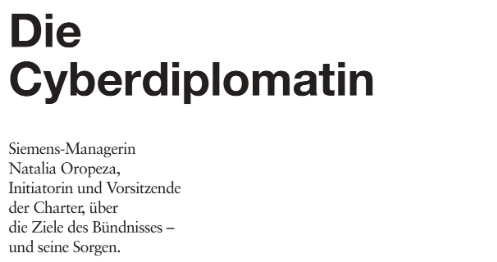Collaboration and information sharing between trusted partners is one of the main strategic objectives in the Charter of Trust and we practice what we preach. This week we are pleased to announce that the Charter of Trust, under its Principle 8, has started an initiative to share cyber threat information.
This initiative covers three dimensions: information sharing policy, establishing a human network (H2H) and implementing a shared threat intelligence platform. This initiative is proceeding as a proof of concept over the next six months.
Why is sharing threat information important and why the Charter of Trust?
Trusted partners within the Charter bring in observations from different industry sectors and geographies and thereby develop the partners’ collective experience, visibility, and knowledge. This capability is particularly valuable when a wave of new cyber threats manifests itself. An established sharing policy enables knowledge transfer between member organizations and enhances detection and defense of fast-moving threats such as ransomware and destructive attacks. Trusted partners can better protect their networks and to some extent, their customer networks.
As an example, the global Covid-19/Coronavirus pandemic created a massive opportunity for threat actors to exploit. Soon after the pandemic was declared, threat actors took advantage of the public’s fear of the virus and crafted spear phishing campaigns that offered vaccines, treatments, infection heat maps or access to government relief programs. Their tactics compromised organizations with malicious software like ransomware and likely resulted in productivity and financial losses. Sharing threat information can mitigate these types of attacks. Information used to mitigate such threats may include the domains used in the attacks or information on the malware deployed in an attack.
In starting this initiative, we have learnt from similar sector specific Information Sharing and Analysis Centres (ISACs) who have provided us with useful insights in how to proceed, such as the usage of the Traffic Light Protocol to categorize different levels of threat intelligence and have expressed interest in working with us in the future. The threat intelligence sharing platform we are using in this phase is based on a similar threat intelligence community building initiative launched by Trustar and the City of Los Angeles (https://www.lacyberlab.org/).


You may also like

Chairwoman Natalia Oropeza in Brandeins Magazine
In an interview with Dorit Kowitz, Natalia dives deep into the pressing issues facing the cybersecurity landscape, explaining how the Charter of Trust bundles the expertise of different businesses across several regions to stay resilient in the face of evolving threats. As Natalia Oropeza says: "We all win if cybercrime doesn’t win."
Here are three key insights from her interview:
🔑 Collaboration is essential: No single organization can tackle cyber threats alone. The Charter of Trust is a prime example that businesses nowadays are more transparent when it comes to attacks and that sharing information in this field can be beneficial.
🔑 Addressing the digital skills gap: The Charter of Trust is working to address the global shortage of cybersecurity professionals by encouraging diversity and actively promoting opportunities for women to join the field.
🔑 Unified regulations: Harmonizing global cybersecurity standards will reduce vulnerabilities, helping businesses and governments combat threats more effectively.
The full interview is available here: https://lnkd.in/gRm6ZDGC


Cybersecurity Awareness Month
The complexity and urgency of this topic gathered a lot of interest, with 600+ attendees throughout the whole panel, which was composed of Jon-Paul Jones, COO at AZ Commercial, Firas Ben Hassan, GenAI expert & Manager of AllianzGPT at AZ Technology, Dr. Martin J. Krämer, External Security Awareness Advocate at KnowBe4, and Dr Sumit Chanda, Global CISO at Eviden & Chair of the Global External Engagement Working Group at the Charter of Trust.
We are pleased to see Dr. Sumit Chanda from Eviden bringing in his unique CISO insight on what these emerging technologies mean in day-to-day cybersecurity practices and bringing in the Charter of Trust perspective on this topic as well.
Thank you, Ervin Cihan and Haydn Griffiths for inviting other CoT Partners and for the great initiatives that Allianz is putting together within this year’s Security Awareness Month. And special thanks to Heather Armond for the great moderation.


UK/EU Summit - “Risk to Resilience”
💡Under the theme “Risk to Resilience” the first event of this series was held in London and brought together professionals from different industries and regions. Detlef participated in the panel about the complex regulatory landscape and emphasized that new legislation like the EU AI Act, DORA and Hashtag#NIS2 continue to push the standard of care on cybersecurity and other risks.
Thanks to Shared Assessments for organizing such an amazing event and inviting the Charter of Trust to participate in this high-class panel alongside Andrew Moyad, CEO at Shared Assessments.



